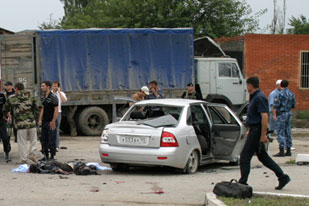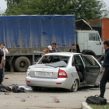
Chechen Government Inadequately Prepared for Suicide Bombers
Publication: Eurasia Daily Monitor Volume: 6 Issue: 165
By:

As Russian President Dmitry Medvedev finally had to admit, the situation in the North Caucasus is slowly changing for the worse and not for the better (Prime-Tass, August 19). Medvedev’s admission stands in stark contrast to the public position of Prime Minister Vladimir Putin, who makes regular trips to Chechnya to support his protégé Ramzan Kadyrov and never tires of proclaiming that life in Chechnya is returning to normal (ITAR-TASS, August 24).
This summer was the bloodiest season of recent years – explosions and attacks on policemen, government agencies and clergy became so routine that the victims no longer generate any public concern. In fact, by now the entire North Caucasus region (except the Republic of Adygeya and parts of Karachaevo-Cherkessia) looks like Chechnya circa 2000-2004.
In the meantime, human rights activists from Russia’s Memorial organization and the Moscow Helsinki Group said at a September 2 press conference in Moscow that the law enforcement troops in the North Caucasus are in fact acting as death squads (www.memo.ru, September 4). These units are responsible for the deaths of many young men who are generally declared after the fact to have been members of the insurgency. This practice of the law enforcement sector has become a common modus operandi in the region, and the focus of a heated public discussion.
The impression one gets is that the public and the government inhabit two different worlds. The threat of the Russian army has been replaced by the threat of the Russian Federal Security Service (FSB) and the Main Intelligence Directorate of the General Staff (GRU), as well as the Chechen government itself. It is this official government policy that affects public sentiment a lot more than all the actions of the insurgents.
As for the rebels, they too have had to change their tactics. Previously, their attacks consisted of isolated incidents and low-profile trips to nearby towns for provisions. However, under pressure from the government, which made yet another "renewed" commitment to the total eradication of the insurgency, the insurgency escalated its activities as well. The spring address of rebel leader Dokka Umarov, who stated that the resistance will be changing its tactics, was dismissed as a propaganda tool at the time, but the events of the past summer proved that these statements have to be taken a lot more seriously. Today the use of suicide bombers has become the next pressure tactic the insurgency is using in their fight against the government. As a result, law enforcement troops today feel that there are suicide bombers around every corner, and the police describe all of their operations as anti-suicide bomber raids (www.regions.ru, September 5). The police force and the public are terrified by the expectation of the next suicide attack. For instance, on September 1, the first day of school, many parents kept their children home out of fear of potential attacks.
The anti-insurgency effort now involves every segment of society, including the army, the police, special services, clergy, intelligentsia and even parliamentarians. Aslan Maskhadov, the former Defense Minister and current member of Ramzan Kadyrov’s parliament Magomed Khambiev has also joined in the fight, along with his former associates in the Ichkeria cause – Ibrahim Khultygov, Sha’a Turlayev and others. Yesterday’s insurgents are not prepared to die for Ramzan Kadyrov and Vladimir Putin, so today they prefer to tour across the republic to promote peaceful development.
As for the Chechen president, he recently made a televised appearance during which he personally interrogated three out of four detained men accused of suicide attacks (www.chechnya-media.com/upload/index.php?link=6). The most striking thing about the alleged rebels, all young men under 18 years of age, was their odd behavior. The explanation they provided was so simplistic that the public, normally reluctant to comment on the government’s actions, reacted with censure (www.chechnya.kavkaz-uzel.ru, September 5). Almost all of the detained men parroted whatever Ramzan Kadyrov said, including the name of the Arab fighter erroneously pronounced as Mokhdan (the man in question’s real name is Mukhanneda, the aide to the military commander of the Caucasus Emirate.) The televised confessions, in short, came short of the image of men who ostensibly were ready to give up their lives in the name of the resistance.
The young men claimed that they met with insurgents accidentally outside of the Avtury village and were asked for help to obtain food. After a few phone calls, the young men allegedly were ready to go and blow up a police district in Grozny in a suicide attack. The more realistic explanation is that the young men have helped the rebels in some way, but that the government decided to take advantage of the situation and declare them to be suicide bombers.
The televised confessions must have been planned in advance to support Kadyrov’s subsequent larger political plans, including delegating the task of combating the insurgency to the Chechen public itself. The next day, in a move reminiscent of old Soviet traditions, the president orchestrated condemnation of the rebels at every mosque in Chechnya. During sermons on Friday, September 4, imams and religious judges across the republic denounced all insurgents and suicide attackers (www.chechnyatoday.com, September 5). The sermons became the sole focus of the 55-minute evening news program on Chechen TV: the coverage featured mosque after mosque performing the government-sponsored spectacle. The project was meant to demonstrate the "common outrage" of the people in support of their leader President Kadyrov.
In the end, no real policy changes took place. The insurgency is certain to continue striking all through September, after which they will likely assume a lower profile during the fall and winter season. The populace will continue to quietly observe the conflict between the rebels and the government, and their sympathies are not likely to be with the latter. The government stance of holding whole families and clans responsible for the actions of their rebel relatives turns the entire population into hostages, which cannot fail to alienate the public from the government.




